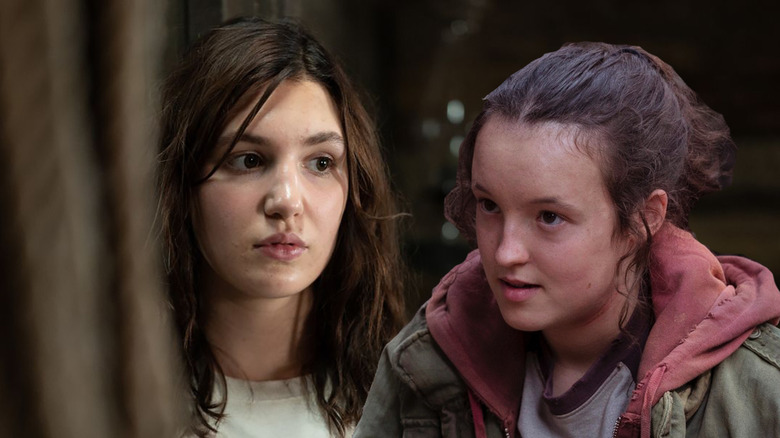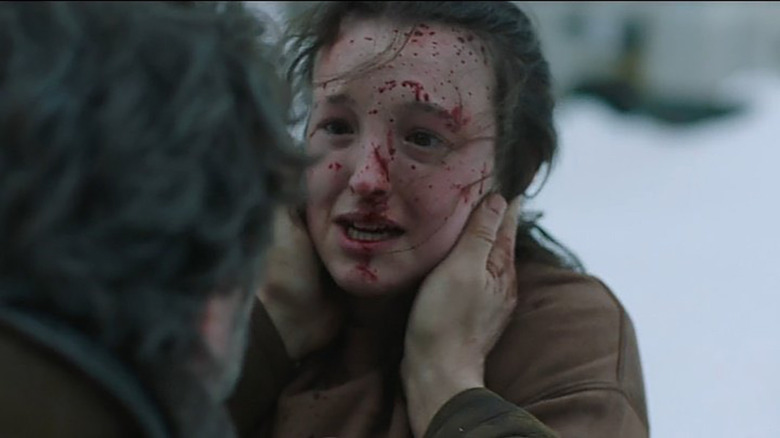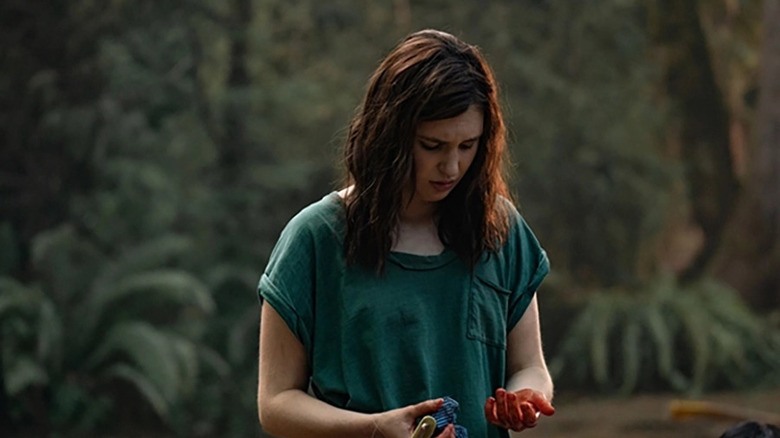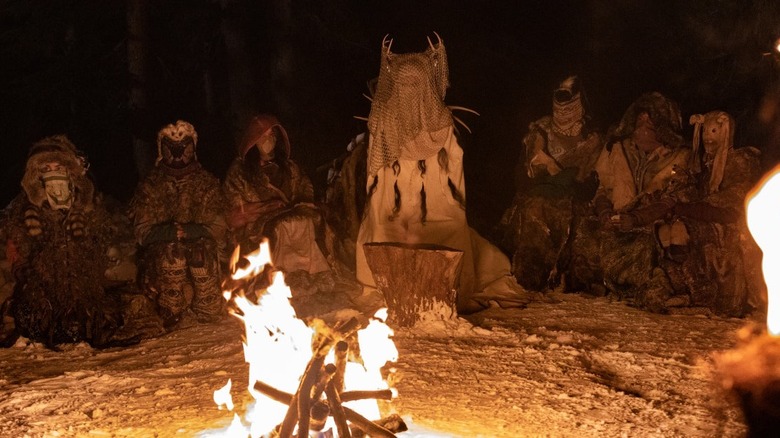The Last Of Us And Yellowjackets Pair Uncanny Horror With Common Misery In The Same Winning Blend
This post contains spoilers for season 1 of "The Last of Us" and "Yellowjackets."
I was thinking about this the other day, but I'm almost positive that I've referenced "Hell is a teenage girl" from Karyn Kusama and Diablo Cody's brilliant horror film, "Jennifer's Body," more than any other movie quote in existence. The opening line delivered by Amanda Seyfried's Anita "Needy" Lesnicki has been living rent-free in my head for nearly a decade and a half because for generations of teenage girls, myself included, life really was Hell on earth.
Coming-of-age stories are nothing new, but they really picked up during the 1950s with films like "Rebel Without a Cause" proving there was a valuable market for movies that treated teenagers like fully realized people. Ever since, we've enjoyed countless explorations of the teenage experience, ranging from the heyday of John Hughes' Molly Ringwald trilogy to Sam Levinson's addictively controversial series, "Euphoria." But the phrase "teen girl story" tends to evoke thoughts of shopping, high school proms, crying over boys, or the Valspeak social dialect made popular by films like "Valley Girl" or "Clueless."
These hot-pink-tinted feel-good stories dominate entertainment centering on teen girl characters, reserving more complicated topics to melodramatic arcs with the subtlety of a sledgehammer. Thankfully, in the last few years, a new type of teen girl story has emerged in the mainstream, where painful experiences that too many real-life teenage girls endure are validated on screen with a careful, empathetic hand and given the monstrous gravity they've always deserved. With shows like "The Last of Us" and "Yellowjackets," teen girls (and former teen girls) are seeing aspects of their own coming-of-age journey typically reserved for Lifetime original movies and after-school specials reflected on screen, with the added intensity of horror elements.
'Get off of me!'
In "The Last of Us," teenage Ellie's life is unimaginably hard, but she still finds ways to get through it. She loves a good pun, takes great delight in how her sailor's mouth makes every adult around her uncomfortable, and doesn't put up with anyone's crap. She's an angsty, feisty teen in every sense of the word, but the series never tries to treat her emotions as overdramatic. Things suck for Ellie, and the show gives her the space to express just how much things suck.
In episode 8, Ellie comes face to face with a threat arguably worse than death or zombies — David, an adult cannibal who wants to take Ellie as his sexual conquest. Ellie fights back tooth and nail when dealing with David, breaking his finger as a warning, and then later, violently bludgeons him to death. As /Film's Valerie Ettenhofer so expertly states in her analysis of the performance, "In everyday scenarios, conversations with an undercurrent of implied sexual violence have become so normalized that girls learn from an early age to nod and smile and not cause a fuss in order to safely make it out the other side." Ellie fights back, something so many of us were denied the opportunity to do, but that doesn't mean the experience doesn't still haunt her.
When she leaves the scene of carnage, Joel (Pedro Pascal) touches her shoulders from behind her, and her immediate instinct is to scream, "No! Get off of me!" She killed David, but the looming threat of him doesn't go away with his death. I'm in my 30s and I still have the instinctual reaction to flail and flinch when I'm touched without warning. Watching Ellie respond the same way I did then, and often do now, was as effective in my healing process as therapy.
Presented with authenticity
While Ellie is one of the handful of teenagers we see on "The Last of Us," the hit Showtime series "Yellowjackets" has an entire girl's soccer team from which to explore the teenage experience. All of the young women in the 1996 arc of "Yellowjackets" are dealing with a multitude of personal traumas, and that was before their plane crashed and left them stranded in the Canadian wilderness for 19 months. Natalie (Sophie Thatcher) comes from an abusive household, Taissa (Jasmin Savoy-Brown) is navigating her budding queerness, Shauna (Sophie Nélisse) is currently pregnant with the baby of her best friend's boyfriend, and this is just the tip of the iceberg for team Yellowjackets.
I wrote last year about why the episode showcasing Shauna's attempt at a DIY abortion was so important, predominantly because of how authentically teenage her thought process was in how she approached it. As teen stories are almost exclusively written by adults, there's often the privilege of hindsight thrown into the mix. When you're 17 years old, you don't always have the emotional maturity to "correctly" process or handle devastating life experiences, which is why it always sounds hokey when these stories play out on "very special episodes" that are thinly-veiled cautionary tales from adults but projected through the mouths of teenage characters.
It's not that subjects like sexual assault, abortion, drug abuse, domestic violence, alcoholism, or any number of "taboo teen topics" haven't been covered before in film and television, it's that we've truly never seen such honest and messy portrayals. Shauna's abortion scene aired before the overturning of Roe v. Wade, which makes the weight of the episode even heavier. According to the ACLU, almost 350,000 U.S. teenagers under the age of 18 become pregnant each year with 31% seeking an abortion. Stories like Shauna's are not isolated, and it's about damn time the media reflects that.
There are worse things than monsters
But the other thing that "The Last of Us" and "Yellowjackets" have in common outside of their phenomenal teenage portrayals, is the fact that these shows are set against the backdrop of horrific circumstances. Ellie is living in a post-apocalyptic hellscape filled with mushroom-covered zombies, revolutionary militia groups, a corrupt government, and a society gone mad. "Yellowjackets" deals with not just the horror of surviving a plane crash, but also the dangers of the wilderness, having to resort to cannibalism, a fanatical cult, murder, and what seems to be supernatural forces. There is horror at every turn for the teen girls of both shows, but their personal traumas are given the same treatment as any of the situations grounded in genre tropes.
Horror has often served as a metaphor for teenage angst and coming-of-age, from the repression of Carrie White to the justified rage of the women in "The Craft." But "The Last of Us" and "Yellowjackets" aren't hiding their messaging in symbolism, they're allowing it to live alongside make-believe monsters as a reminder that Needy was right, "Hell is a teenage girl." Sometimes, the things teenage girls experience are far worse than any cannibal cult or intimidating Bloater, but irreparably change us with the same intensity.
The season finale of "The Last of Us" debuts on HBO and HBO Max on March 12, 2023, while season 2 of "Yellowjackets" begins on March 26, 2023 on Showtime.



